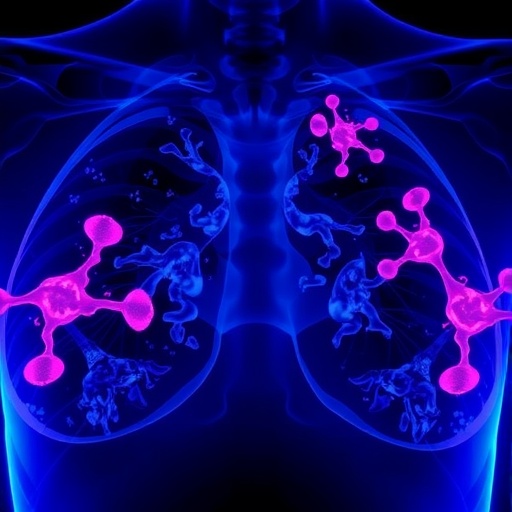A groundbreaking antibody therapy developed by scientists at King’s College London shows promising potential in restricting the growth of treatment-resistant breast cancers, notably those classified as triple-negative—a subtype that has long posed significant therapeutic challenges. This innovative approach employs a uniquely engineered antibody, termed a ‘triple-engineered antibody,’ designed to engage cancer cells and simultaneously draw immune cells to mount a potent anti-tumor response. Such dual engagement opens new vistas for treatment options in aggressive cancer types previously deemed difficult to manage.
The triple-negative breast cancer (TNBC) subtype accounts for approximately 15% of all breast cancer diagnoses and is characterized by the absence of estrogen receptors, progesterone receptors, and HER2 protein. This absence renders conventional hormone therapies and HER2-targeted drugs ineffective, leaving patients with limited therapeutic avenues and elevated risks of recurrence and metastasis. The novel therapeutic approach developed by King’s College directly addresses this unmet clinical need by restoring and augmenting immune system activity within the tumor microenvironment.
Central to this strategy is the engineering of an antibody molecule with modifications on multiple domains that enable simultaneous binding to distinct targets. On one end, the antibody latches specifically onto cancer cells, allowing precise targeting. On the other end, it has enhanced affinity for activating immune cells such as natural killer (NK) cells and macrophages, effectively bridging the innate immune response to the site of the tumor. This sophisticated design amplifies immune cell recruitment and activation, overcoming the suppressed state often prevalent in the tumor milieu.
Historically, antibody therapies in cancer treatment have focused primarily on targeting tumor antigens to neutralize cancer cells. However, their capacity to activate immune effector functions has been less than optimal, especially in breast cancers where immune cell activity is highly suppressed. To confront this challenge, the King’s College team has innovated by introducing structural changes in the antibody’s Fc region—the portion responsible for immune receptor engagement—thus enhancing its ability to bind Fc gamma receptors (FcγRs) on immune cells and stimulate robust immune activation.
Laboratory experiments, supplemented by animal model validation, demonstrated that the triple-engineered antibody exhibits stronger binding affinity to activating receptors on immune cells compared to existing antibodies used in breast cancer therapy. This increased affinity translates into more efficient immune synapse formation between immune cells and cancer cells, promoting enhanced cytotoxic activity. Consequently, tumors showed significantly reduced growth, even in models representing triple-negative and treatment-resistant breast cancers, highlighting the therapeutic potential of this approach.
Beyond localized tumor effects, the engineered antibody also activates circulating immune cells in the bloodstream, potentially offering systemic immunological surveillance and eradication of disseminated tumor cells. This systemic immunity could be critical in preventing metastasis and achieving durable treatment responses. Importantly, this comprehensive immune activation distinguishes this therapy from conventional antibodies that may only activate immune cells weakly or locally.
According to Dr. Alicia Chenoweth, the first author of the study, minor but strategic alterations to the antibody structure can drastically enhance its immune-stimulating capacity. These modifications enable the antibody not only to activate dormant immune cells within the tumor but also to reprogram them into a more potent anti-cancer state. Such molecular reprogramming is essential for circumventing the immunosuppressive tumor microenvironment that often limits the efficacy of immunotherapies.
Professor Sophia Karagiannis, who spearheaded the research, highlights the novelty of leveraging immune cell receptor interactions previously unexplored in cancer therapeutics. By tailoring antibodies to engage multiple receptor types more effectively, the team pioneers a methodology with potential broad applicability beyond breast cancer. This design philosophy paves the way for next-generation immunotherapies with enhanced precision and potency.
Given the significant challenges associated with TNBC and treatment-resistant HER2-positive cancers—where therapeutic resistance remains a formidable obstacle—the development of such an immune-active antibody could revolutionize existing cancer treatment paradigms. For patients facing limited options due to resistant disease, this approach could offer renewed hope by reawakening the immune system’s capacity to fight cancer more aggressively.
The implications extend beyond breast cancer. Some targets of this triple-engineered antibody are also expressed in ovarian and endometrial cancers, suggesting that this platform technology might catalyze breakthroughs across various solid tumors. The versatility of immune cell activation and the modularity of antibody design suggest a broad clinical potential, which is currently under active investigation.
The research team is advancing preclinical development efforts to optimize the antibody’s pharmacokinetic properties, aiming to prolong its half-life and enhance stability in circulation. Additionally, they are exploring modifications to broaden its immune activation spectrum, targeting a wider array of immune cell populations involved in anti-tumor immunity. These refinements will be critical steps before transitioning into human clinical trials.
This study, recently published in the peer-reviewed journal Cancer Research, underscores the importance of integrating immunological insights with antibody engineering to overcome complex therapeutic challenges. Funded in part by Breast Cancer Now through the Asda Tickled Pink initiative, which supports pioneering research at King’s College London, this work exemplifies translational cancer science targeted at unmet patient needs.
In summary, the development of a triple-engineered antibody capable of robustly activating suppressed immune cells within treatment-resistant breast cancers marks a significant leap forward in immunotherapy. By harnessing the body’s own defenses more effectively than ever before, this innovative strategy could alter the trajectory for aggressive breast cancers and potentially many other malignancies, heralding a new era of cancer treatment.
Subject of Research: Advanced antibody engineering for treatment-resistant breast cancer immunotherapy
Article Title: Triple-Engineered Antibody Unlocks Immune Activation Against Resistant Breast Cancers
News Publication Date: Not specified
Web References:
References:
- Karagiannis, S. et al. (2024). Cancer Research, American Association for Cancer Research
Image Credits: King’s College London
Keywords: Breast cancer, Antibody therapy, Cancer immunotherapy, Triple-negative breast cancer, Immune activation, Tumor microenvironment




